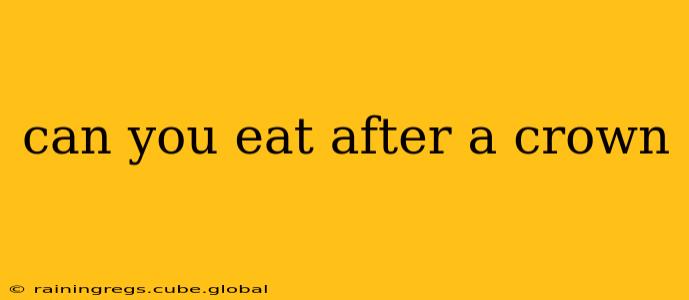Getting a dental crown is a significant step in restoring your oral health. But after the procedure, a common question arises: when can I eat normally again? The answer isn't a simple yes or no. It depends on several factors, and rushing the process could lead to complications. This guide will detail what you can and can't eat after receiving a crown, along with addressing common concerns.
What Can I Eat Immediately After Getting a Crown?
Immediately following the procedure, your mouth will likely be numb. This is due to the local anesthetic used during the process. Until the numbness wears off completely, it's crucial to avoid eating or drinking anything hot, cold, or overly chewy. This is to prevent accidental biting or burning of your gums or cheek, while also protecting the newly placed crown. Stick to room-temperature liquids like water or clear broths.
How Long Should I Wait Before Eating Solid Foods?
This depends on several factors, including:
- The type of anesthesia used: A longer-lasting anesthetic will require a longer waiting period.
- Your dentist's specific instructions: Your dentist will provide personalized post-operative care instructions. Always follow their recommendations.
- The overall comfort level: You should feel comfortable enough to chew and swallow without discomfort before resuming solid foods.
Generally, it's recommended to wait at least a few hours after the numbness has subsided before attempting to eat solid foods. Start with soft foods and gradually progress to more substantial meals as you feel comfortable.
What Foods Are Safe to Eat After Getting a Crown?
Initially, focus on soft, easy-to-chew foods that won't put undue pressure on your crown or irritate your gums. Good options include:
- Yogurt: Provides protein and is gentle on the gums.
- Applesauce: Easy to swallow and provides nutrients.
- Mashed potatoes: A comforting and nutritious option.
- Scrambled eggs: A good source of protein.
- Soft cooked vegetables: Choose options like carrots or squash that are cooked until very soft.
- Smoothies: A good way to get nutrients and hydration.
What Foods Should I Avoid After Getting a Crown?
To protect your new crown and ensure its longevity, avoid these foods for at least the first few weeks:
- Hard, crunchy foods: Nuts, hard candies, popcorn, ice, etc. These can chip or damage the crown.
- Sticky, chewy foods: Caramel, taffy, gummy bears, etc. These can pull the crown loose.
- Tough meats: Steak, jerky, etc. These require significant chewing pressure.
- Foods that require excessive biting force: Apples, carrots (raw), etc.
What if My Crown Feels Loose After Eating?
If your crown feels loose, or if you experience any pain or discomfort, contact your dentist immediately. Do not attempt to fix it yourself.
How Long Does it Take for a Crown to Fully Settle?
It typically takes a few days to several weeks for the area surrounding the crown to fully heal. During this time, you may experience some minor sensitivity, which should gradually improve.
Can I Eat Anything I Want After a Few Weeks?
After the initial healing period, you can generally return to your normal diet. However, it's always advisable to be mindful of foods that could potentially damage the crown in the long term. Continue to avoid extremely hard or sticky foods to maintain the integrity and longevity of your crown.
Remember, every patient's experience is unique. Always follow your dentist's specific instructions for post-operative care. If you have any concerns or questions, don't hesitate to reach out to them. A healthy mouth contributes significantly to overall well-being, and careful adherence to post-crown care significantly contributes to its long-term success.
